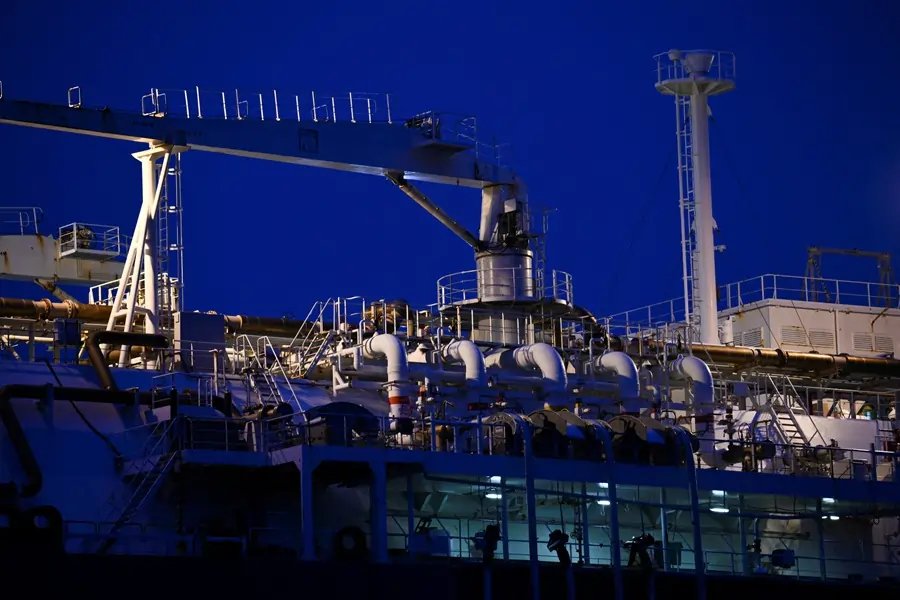Analysis-German gas levy limbo raises risk of higher costs for edgy neighbours
Published by Jessica Weisman-Pitts
Posted on December 4, 2024
4 min readLast updated: January 28, 2026

Published by Jessica Weisman-Pitts
Posted on December 4, 2024
4 min readLast updated: January 28, 2026

By Vera Eckert
FRANKFURT (Reuters) – The collapse of Germany’s governing coalition risks delaying a draft law on waiving a costly gas storage levy for foreign buyers from next year and raising tension with European neighbours that face higher prices.
Supply security is already worrying European governments as cold weather has pushed gas prices to their highest in nearly 13 months, and a Russian transit deal to supply gas to Europe via Ukraine expires at the end of the year.
Germany’s gas neutrality charge, which storage operator Trading Hub Europe (THE) receives for gathering and releasing volumes from German caverns, Europe’s largest, will increase by 20% from January, THE said last month.
That could add 7% to energy costs in countries such as Austria and the Czech Republic, according to Reuters’ calculations based on current gas prices.
With an annual gas import bill of several billion euros, Austria has estimated it has paid more than 50 million euros ($53 million) for the German levy since 2022.
Parliamentary sources from the various parties within Germany’s coalition, which collapsed in November, say infighting meant a November timetable for the bill was scrapped and that the main opposition party will not support urgent bills ahead of a vote of confidence by Chancellor Olaf Scholz in mid-December.
Asked about the status of the legislation on Wednesday, a spokesperson for the Berlin Economy Ministry said it depended on the parliamentary process. Time is, however, short ahead of a snap election in February.
In the gas markets, dealers said the impact has already been to make deals harder, reducing earnings through market trade and pushing some customers towards seeking Russian gas.
“Our members have reported adverse effects on liquidity and prices spreads in forward markets around Germany as a result,” said Doug Wood, chair of the Energy Traders Europe association’s gas committee. The group represents 170 member companies.
RUSSIAN RISK
In the event Germany, owner of 23 billion cubic metres of storage capacity, reneges on legal obligations, traders say buyers would be forced to continue to rely on the Russian supplies Europe is trying to avoid.
Czech Prime Minister Petr Fiala said he was unhappy about the use of Russian gas, but cost was a concern.
“The fact that, momentarily, traders are using cheaper gas from Russia is a reality, and I am not happy about it,” he said on platform X.
Flows into the country from Slovakia, via Russia and Ukraine, accounted for over 90% of supplies in November and fourth quarter totals to date were at 77% versus 38% in the third, data from Czech pipeline system operator Net4Gas showed.
Austria has sought to pressure Germany into swiftly passing the required amendment.
“Europe is in global competition. We cannot afford such national regulations,” Alfred Stern, CEO of Austrian utility OMV, told Germany’s Sueddeutsche Zeitung on Nov. 27.
Germany agreed to legislate for the waiver after Austria, Hungary, Slovakia and the Czech Republic successfully complained to the European Commission earlier this year that they should not pay for THE’s costs.
THE, appointed by the government to fill parts of Germany’s gas cavern infrastructure in the energy crisis in 2022, excluded border transition points, or virtual trading hubs, when calculating the new fee, assuming the law would be passed.
An EU Commission spokesperson said Brussels upholds concerns that the present fee disturbs the internal market and makes diversification from Russia harder.
“We urge Germany to ensure that the law abolishing the cross-border element of the storage fee is in place as soon as possible,” the spokesperson said.
THE has said its procedure is to only write bills for January sales at the end of March.
It is possible the legislation will have been finalised by then. Failing that, however, German media and parliamentary sources have also said the conservative CDU party, which is tipped to win February elections, could expedite the bill once in office.
($1 = 0.9524 euros)
(Reporting by Vera Eckert in Frankfurt; additional reporting by Julia Payne in Brussels, Markus Wacket and Riham Alkousaa in Berlin, Alexandra Schwarz-Goerlich in Vienna, Susanna Twidale in London and Jan Lopatka and Jason Hovet in Prague; Editing by Christoph Steitz and Barbara Lewis)
A gas levy is a charge imposed on gas storage operators for the costs associated with storing and supplying gas. It can affect energy prices for consumers and businesses.
Supply security refers to the assurance that a country or region will have access to necessary energy resources, such as gas, without significant disruptions.
The EU Commission is the executive body of the European Union responsible for proposing legislation, implementing decisions, and upholding EU treaties.
Energy costs are the expenses incurred by consumers and businesses for the consumption of energy, including electricity and gas prices.
Foreign currency refers to the money used in a country other than one's own, often used in international trade and investment.
Explore more articles in the Finance category
